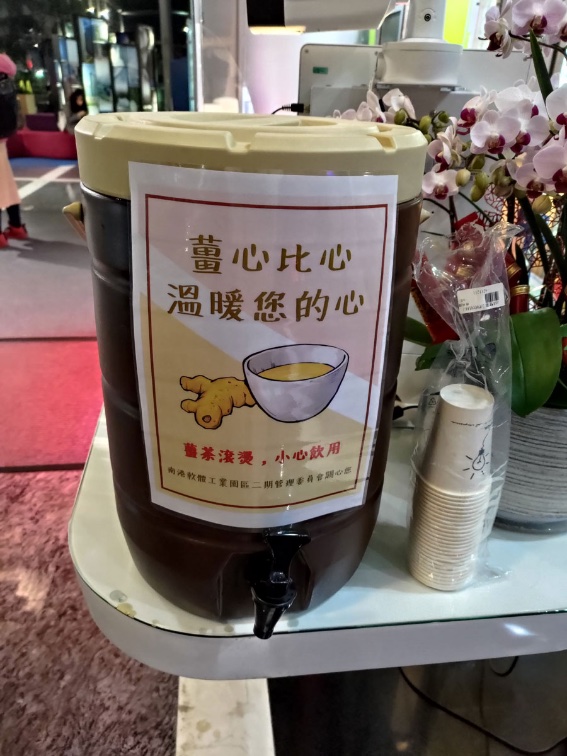Ginger tea
« previous post | next post »
[This is a guest post by Mark Swofford]
Those who have never lived in northern Taiwan during the winter may scoff at the idea that 11 °C (52 °F) can seem miserably cold. But cold it is here nevertheless, especially during a week of seemingly endless rain.
This week an office building in Taipei put out hot ginger tea to help people warm themselves. The top line on the container is “薑心比心” (jiāng xīn bǐ xīn; lit.: “ginger heart compares to heart”). This is a pun for the idiom “將心比心” (jiāngxīnbǐxīn; “be empathic”).
The second line is “溫暖您的心” (wēnnuǎn nín de xīn; “warm your heart”).
Link to MOE (Ministry of Education) Dictionary entry for this.
Selected readings
- "Living fossils: Taiwan tea and salmon" (12/31/19)
- "Sinographs for 'tea'" (1/10/19
- "Caucasian words for tea" (1/26/17)
- "Kung-fu (Gongfu) Tea" (7/20/11)
- "Lap Sangsouchong" (12/3/14)
- "cactus wawa: the strange tale of a strange character" (11/1/14)
- "Cactus Wawa revisited" (4/24/16)

Jacob said,
February 27, 2022 @ 4:00 pm
I will argue that nothing is colder than a Sichuan winter because of the unrelenting grip the cold takes onto one’s absolute core due to the temperature, humidity, and lack of heating.
Separately, how did 薑 become 姜? There is no obvious simplification of strokes, and the previously attested forms on zodiac more closely resemble (to me) the simplified form.
Richard Warmington said,
March 1, 2022 @ 5:37 am
Jacob, at least one Taiwanese dictionary (Far East) lists 姜 as a traditional character, defined as "1. a Chinese family name, 2. ginger". And the following Taiwan dictionary says that turmeric can be written as 姜黃 as well as 薑黃.
https://www.moedict.tw/%E5%A7%9C%E9%BB%83
I think 薑 is the character predominantly used for "ginger" in Taiwan. Nevertherless, if 姜 and 薑 are pronounced the same, and both are traditional characters used to mean "ginger", it makes sense that 姜 was adopted as the simplified form. In many cases, the simplification process involved the selection of one of several traditional variants — typically the one with the fewest strokes.
Daniel Barkalow said,
March 1, 2022 @ 5:03 pm
I've found that humid air around 11C is a lot more effective at getting the heat out of you than significantly colder air that doesn't support as much moisture, and the more humid air is harder to address with clothing. It may be like a warm day for winter, but it's also like you're touching a bare metal gate with your whole body all the time.
Alexander Browne said,
March 1, 2022 @ 9:14 pm
5 °C was picnic lunch weather for me yesterday, but it was sunny and dry.
wanda said,
March 1, 2022 @ 10:21 pm
That temperature feels cold in San Diego too. When I was growing up in the Northeast, my house had actual insulation and a decent heating system. Here my house is expensive but as far as I can tell the heat just leaves through the windows and walls.
San Francisco would regularly get that temperature too, and the houses would often feel cold. I had a friend renting an apartment in an old house, and one of the doorframes on an interior door came off, so we could see into the space between the walls. The builders had used crumpled up newspaper for insulation!
Rodger C said,
March 2, 2022 @ 11:00 am
wanda, I lived in San Diego for four years. It was like what a John Crowley character says of Italy: cold weather is treated as an unpredictable disaster.
Andrew Usher said,
March 4, 2022 @ 7:54 am
There is no scientific basis for Daniel Barkalow's thinking: humidity from the air can't possibly condense on a surface (you) warmer than it is. How cold it feels, or more accurately, hoe much you feel cold, has many explanations but that can't be one of them.
k_over_hbarc at yahoo.com
Philip Taylor said,
March 5, 2022 @ 5:18 am
The answer is surely conduction, is it not Andrew ? Humid air conducts heat far more effectively than does dry air, so in cold humid conditions one loses heat by conduction far more quickly than one would in otherwise identical cold dry conditions.